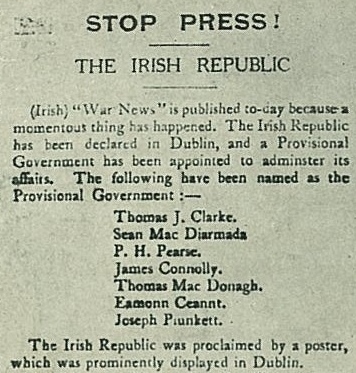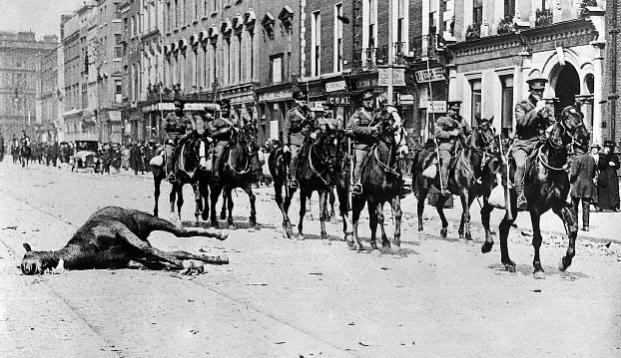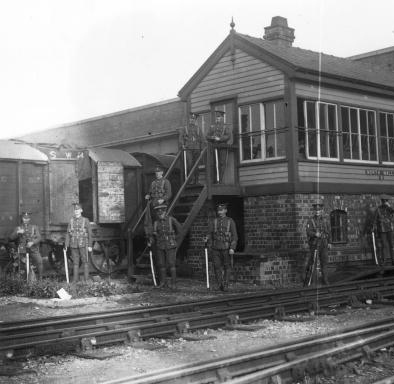“I thought that no man liveth and dieth to himself, so I put behind what I thought and what I did , the panorama of the world I lived in- the things that made me.”
Sean O’Casey (1948)
This year marks the 50th anniversary of the death of Sean O’Casey in 1964 . O’Casey spent many years of his life living locally , first at 25 Hawthorn Terrace and afterwards at 18 Abercorn Road. These were important years which helped shape O’Casey as a man, and would provide him with the inspiration ( the characters , language and attitudes) that would reappear in his writing throughout his life.
Between 1939 and 1955 he published six volumes of Autobiography. The first three in particular contain much about his life as a North Dock resident. Throughout this anniversary year , we intend to present short extracts from these works , concentrating on sections which are most relevant to the area . Over the next three days we will feature sections on events during the Easter Rising 1916. O’Casey was a non combatant in the Rising , and his account is very much from a civilians perspective , and is a unique record of events locally , not recorded elsewhere. We start on the Monday afternoon, as a quiet Dublin City suddenly changes -
“Down the centre of O’Connell Street, silent but for the tramp of their feet, came hundreds of armed Volunteers and Irish Citizen Army, led by Pearse, Connolly and Tom Clarke, to halt, wheel and face the General Post Office.
There go the go-boys! Muttered an old man, half to himself and half to an elderly, thin lady beside him who had stopped to help him stare at the volunteers. Well, Mac Neill put a stop to their gallop! What th’ hell are th’ up to now? They seem to be bent on disturbin’ th’ whoremony of the sacred day. Goin’ in, eh? Wha’ for, I wondher? Can’t be wantin’ postage stamps. Can’t be to get th’ right time, for there’s a clock in th’ window. What’r they doin, ma’am? I dunno. Somethin’ brewin’? Ma’am, there’s always somethin’ brewin’. I’m seventy, an’ I’ve never known an hour that I didn’t hear tell of somethin’ brewin’. Be God, they’re takin’ th’ clock outa th’ window! That’s odd, now. Looka, they’re smashin’ out th’ windows with their rifles! There’s a shower o’ glass – right over th’ passers-by! That’s goin’ beyond th’ beyond. Tha’s, tha’s just hooliganism. We betther be gettin’ outa here – th’ police’ll be here any minute! Didn’ I tell you before, ma’am, I dunno! They’re shovin’ out the Post Office workers; pointin’ their guns at them. We betther be getting’ outa here while we’re safe. Houl’ on a second – here’s someone out to read a paper. What’s he sayin’? I dunno. How th’ hell can you expect a fella to hear from here? Oh! Pushin’ th’ people off th’ streets, now. Eh? G’ on home, is it? An’ who are you t’ ordher me about? Takin’ over th’ city? D’ye tell me that? Well, you’re not goin’ to take over me! I’m a peaceful man out on a peaceful sthroll on a peace-ful day, an’ I stand be me constitutional rights. Gun-fire here soon? Arrah, from where? From where, ma’am? I dunno, I’m tellin’ you! He says he’s speakin’ in th’ name of th’ Irish Republic, so now you’re as wise as I am meself. Th’ police’ll soon explain matthers. Don’t be talkin’, looka what’s comin’ up O’Connell Street! A company o’ throttin’ lancers – full regalia with carbines, lances, an’ all! Comin’ to clear th’ Post Office. Don’t be pushin’ me ribs in, ma’am! Hear th’ jingle of them! This looks like busi-ness. Here we see, ma’am, the Irish Republic endin’ quicker’n it began. Jasus, Mary, an’ Joseph! th’ fools are firin’ on them! Here get outa th’ way, ma’am, an’ let a man move! Near knocked you down? Why th’ hell are you clingin’ on me tail for, then? Didn’ I tell you hours ago that it was dangerous dawdlin’ here? D’ye hear that volley! Looka th’ police runnin’ for their lives! Here, let’s get outa this; we’ve dilly-dallied too long where we’ve no real business to be! “
“When the shooting seemed to have got less, Sean slid cautiously out of his shelter and, keeping close to the walls of the shop and house, made his way home. Darkness had fallen, and his near-sighted eyes could see but a few feet in front of them. Coming to the bridge across the canal at Spencer Dock, his semi-consciousness heard a calm, tired voice say somewhere, Halt! Who goes there? A few steps farther, and the voice, tired no longer, terse and threatening, said again, Who goes there? In the hesitating shock of seeing nothing, he managed to say, Friend, and a moment after, passed by the dim form of a soldier with the rifle at the ready, who passed him by with the advice of, Answer quicker, next time friend. A narrow squeak, that! A few seconds more of hesitation and he’d have been high among the stars. Watch your steps, Sean. A little farther on, his breast almost touched a bayonet as another voice said, Who goes there? Murmuring, Friend, the bayonet was lowered, and a soldier’s voice said, Pass on, friend. They were dotted along the road up to the corner of the street that held his home. Pouring in by the North Wall, and no one here to stop them. Poor ould Ireland!
He halted at the doorway thrust through with the knowledge that it was dangerous for him to be abroad at night. His eyes were blank in the darkness. He thought of the things that had happened, and wondered how it would all end. It was a deserted city now, but for those who fought each other. The pubs had emptied, the trams has jingled back to their sheds, the shops were shut. Lansdowne Road, Rathmines, and Rathgar gathered up their fine clothes and ran home; the janitors of the Bank of Ireland came rushing out to slam-to the great iron gates with a clang, turning the thick lips of the lock with hurried hands, and the sentries rushed into the guardroom; those coming home from Fairyhouse had been stopped by British barricades, and choruses of How th’ hell am I goin’ to get home ascended to God and His blessed saints. And Sean, standing in the doorway of his house, gazed back towards the centre of the city and saw a great plume of flame rising high into the sky: the first passion flower had blossomed.”
Extracts from “Drums under the windows” (1945)
All six volumes of Sean O’Casey Autobiographies, republished by Faber and Faber , are currently available in both print and kindle editions.
If you have a favourite Sean O’Casey extract please bring it to our attention .
Contact us at eastwallforall@gmail.com





